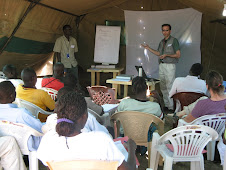When I completed my bachelor's degree in 1994, I believed I would never set foot inside a classroom again--at least, not as a student. Now, in 2009, I am back as both student and teacher. I'm a graduate teaching assistant at North Dakota State University in Fargo. As you might imagine, I'm excited and a bit anxious.
My new colleagues and I spent last week in a communication department orientation that attempted to give us some grounding in teaching, as all of us will be lead instructors in our sections of fundamentals of public speaking, COM 110. Much of the advice given to us reminds me of what they used to tell foreign English language teachers in Taiwan, where I spent a year teaching at what is called a "cram school."
Much of east Asia was (still is, presumably) so desperate for English tutors that virtually any American, Canadian, Australian, or British person can get a job teaching the language. When a new teacher would express any doubt about his or her abilities, the head of the school would say, "You're a native speaker. You know everything you need to know about English. Of course you can teach it!" This, it turned out, is not really true. Native speakers certainly know when something "sounds funny" or is otherwise non-standard, but that's about it without at least some training.
In order to teach in US public schools, for example, a lot of training and testing must be successfully undertaken (sadly, this process still doesn't ensure that all teachers are great). My undergraduate degree is a Bachelor of Science in Education. The "in Education" means that when I graduated, I was automatically certified to teach in the state of North Dakota. I had to pass an exam and have a good GPA to be admitted to the education program, took two years of education classes, observed in many classes, and spent 12 excruciating weeks of my final semester as a student teacher at a high school to get that certification. So I do feel somewhat bemused that when my concerned colleagues at NDSU are expressing doubt about their qualifications to teach, they're told: "You have a degree. It's more than your students have."
I never did go on to teach in North Dakota. Instead, I spent a few more years teaching English overseas. I even taught linguistics at the teachers college of Guinea-Bissau in West Africa (that's how desperate THEY were) for a couple of years. And in my last job, I trained dozens of people to become entry-level radio journalists (see photo). So I'm not uncomfortable as a teacher or trainer, but to be up in front of American college students will be a new experience. Should be fun.
Subscribe to:
Post Comments (Atom)


No comments:
Post a Comment